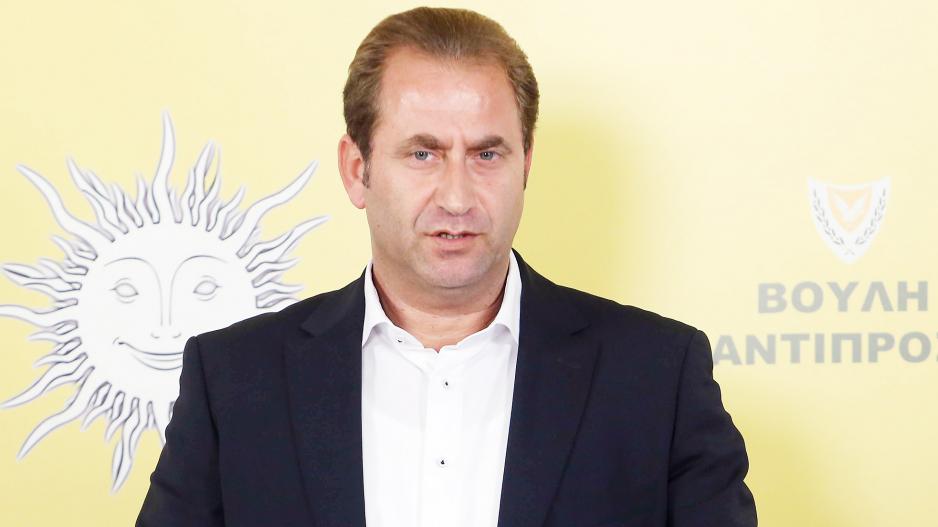
Interview with Yiorgos Loucaides, AKEL Parliamentary Representative
19 July 2020, “HARAVGI’ newspaper
“Imposing sanctions on Turkey is extremely difficult”
“The principal issue is the resumption of negotiations for a solution of the Cyprus problem”
The UN Secretary General is concerned about the lack of progress on the Cyprus problem from Crans Montana onwards, while he reiterates that the absence of a solution is not sustainable. With what actions can and should the Greek Cypriot side respond, provided that it itself is also concerned?
The UN Secretary General stressed, among other things, that “the lack of negotiations since July 2017 does not mean that the situation on the island remains unchanged, either on the political level or in the buffer zone.” He cites as specific examples Varosha, the hydrocarbons issue, the delimitation of the Exclusive Economic Zone (EEZ), the refugee issue and even the pandemic. Furthermore, as you mention in your question, the Secretary General issues a warning that the absence of a solution to the Cyprus problem is increasingly unsustainable. The above-mentioned are not the only worrying references made by the UN Secretary-General.
Nevertheless, what is imperative is that the recommendations which the UN Secretary General again addresses to the sides should be followed, with which we as AKEL fully agree with. The two leaders must cultivate the correct climate among the people for a solution of the Cyprus problem and, above all, to act in a way that puts their theoretical commitments into practice for a resumption of the negotiations from where they kad remained at Crans Montana three years ago.
With Borrell’s visits to Nicosia, Athens and Ankara, the issue of hydrocarbons was almost put on the table of the Greek-Turkish dialogue. To what do you attribute this dangerous turn?
Borell’s statements on the Cyprus problem made during his meeting with Turkish Foreign Minister Mr. Cavousoglou also ring the alarm bell. Mr. Borrell’s only reference to Cyprus was to the discussion between Greece and Turkey on the sharing of hydrocarbon revenues between Greek Cypriots and Turkish Cypriots. This is a very worrying development.
In reality, we have gone from discussing the substance of the Cyprus problem to the exclusive discussion of hydrocarbon issues – indeed on an issue that has been resolved within the context of the convergences as they were agreed between Demetris Christofias and Mehmet Ali Talat.
Unfortunately, instead of the international community focusing on the overall solution of the Cyprus problem, we are now exclusively devoting our time to managing and dealing with issues related to the escalation of tension in the Cyprus EEZ and the sharing of hydrocarbon revenues. This development fully serves Turkey’s agenda and goals.
It goes without saying that these negative developments are directly linked to the serious mistakes and omissions made in the handling of the Cyprus problem, but also linked to the absence of a strategy on the part of the Anastasiades-DISY government, elements that facilitate Turkey in fulfilling its aspirations. For a long time now, as AKEL, we have been stressing and warning that the political compass of the President of the Republic has lost its bearing, as well as of the danger of the Cyprus problem and our country being driven to a dangerous deadlock.
For that reason, what is primarily demanded from Nikos Anastasiades is that he seeks with consistency and steadfastness the return to the agenda, as the principal issue, of the resumption of the negotiations for a solution of the Cyprus problem, as the UN Secretary General has been requesting over the last three years.
Would it perhaps be more productive for Nicosia if the demand for sanctions against Turkey was combined with our commitment to a solution to the Cyprus problem within the agreed framework?
The answer to your question is of course, yes. On the one hand, because the end result has shown the enormous difficulty of imposing sanctions on Turkey, despite the illusions and delusions cultivated to the contrary by the Anastasiades-DISY government. On the other hand, we believe that by restoring the positive agenda regarding the solution of the Cyprus problem, from whom all the involved parties can benefit from, we can expect greater support from the international community and Cyprus’ partners in the European Union. In other words, by doing we can more easily achieve the mobilisation of the international factor, in order to encourage Turkey to accept a solution based on UN resolutions and international law. This is not a theoretical assumption, but it was proven and confirmed at Crans Montana when we had gained significant international support in our efforts to get rid of guarantees, intervention rights and occupation troops.
Therefore, in the equation of gains-losses that Turkey has before it as regards the solution of the Cyprus problem, we must, on the one hand, seek to incur costs arising from the non-solution of the Cyprus problem, but also, on the other hand, Ankara’s realisation of the benefits that will emerge for it as well from a correct, just and viable solution to the Cyprus problem.




